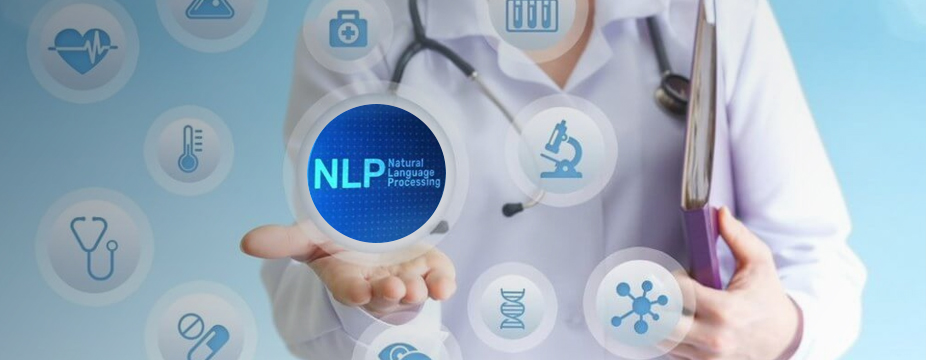|
Getting your Trinity Audio player ready...
|
NLP in Healthcare is exponentially growing. It is projected that it will grow from USD 1030 million to USD 2650 million by 2021 at a CAGR of 20.8%. And it is time for healthcare providers to seriously consider NLP if they didn’t think about it in the past.
NLP (Natural Language Processing) is considered a branch of AI that object towards reducing the communication gap between humans and machines. NLP is an application embedded into a robust system to provide capabilities to understand, store, process, and implement the driven insights in the form of speech or text that is understandable by a human. In the healthcare domain, the importance and usage of NLP systems are growing day by day. And these systems are creating hype about their renowned application across the healthcare domain.
What drives NLP in Healthcare?
Embedding intelligent systems to optimize organization operations, increase quality time, and reduce operating costs is a common reason for a business in every domain. Even in healthcare, the reasons may remain constant at a point. But integrating NLP is helping healthcare beyond this. The two main reasons or use cases that drive NLP in healthcare are:
1. NLP could help in translating human speech and make it understandable by a machine to extract meaning from the information communicated.
2. To harness large chunks of data stored in the form of speech, text, pictographs, images, etc., and to derive meaningful insights, healthcare is leveraging NLP tools.
The set of tasks performed by NLP marks its prominence in Healthcare.
- 1. Identifying the key elements in a lengthy document like clinical notes and health documents. And summarizing the required information into short notes.
- 2. Converting data from machine-readable to human-understandable format.
- 3. Recognize unstructured data sets available in electronic health records and map them to structured formats that could be readable by a machine.
- 4. NLP-based chatbot can answer text queries that require analysis of multiple data sets.
- NLP can be used in optical character recognition to convert the information in clinical test reports, x-rays, and scans into text-based formats to be further readable by a machine.
- 5. NLP facilitates understanding and converts anything dictated into text through speech recognition.
The future of Healthcare with NLP?
Embedding intelligent systems into healthcare units has leaped and the existing applications of NLP in healthcare include speech recognition, improvement in clinical documentation, computer-aided coding, and automated registry reporting. Emerging applications of NLP showing the immediate impact on Healthcare units. Below mentioned are a few applications that help NLP in pursuing a keen role in healthcare.
1. Clinical trial matching improves patient care and allows efficient access to clinical trials. It also helps in maximizing efficiency by providing support to the care team and reducing the burden of conducting and analyzing manual tasks. It clears the roadblocks in manual screening by expediting trial recruitment and by coordinating and monitoring the trial recruitment process.
2. NLP-powered clinical support and prior authorization of decisions made by physicians and staff help hospitals inpatient clinical support, optimize hospital operations and endure the care provided. NLP-based chat assistance and voice recognition systems help in making critical decisions based on patient EHR records.
3. Healthcare can manage population health and re-organize unstructured past patient data by integrating NLP systems and deriving insights that help in offering better treatment at present.
4. NLP can be used in data mining to develop insights regarding formulating a precision medicine for treating patients with rare or new diseases based on their genotype-phenotype history. Understanding a patient’s EHR, and the environmental, and physical factors they live in helps a clinical team in identifying the right pathway of treatment.
5. Imaging workflows: for radiologists tasked with analyzing thousands of patient reports, identifying, comparing, and reporting would be a time-consuming and hectic task. NLP integrated with image-recognizing algorithms can detect the disease identification marks in different images upon a speech annotation.
6. Leveraging NLP helps in identifying and adjusting risk conditions to be provided by a value-based system. Using NLP in assessing the blueprint of implementing technology could help in detecting operation accuracy and risk management in prior.
7. NLP tools are creating an ambient virtual experience between patients and physicians through a virtual platform without any physical meeting. The ambient virtual systems in prior investigate the patient’s EHR to make sure whether the doctor’s presence is true.
The hype and prominence of conversational AI in healthcare are creating a future to be watched for. NLP tools exploration in the healthcare sector from storing clinical data to providing ambient experience are driving the potential and sophisticated growth of NLP technologies. Healthcare units are considering NLP as an integral part of conversational AI, and as a dominant part of intelligent technology that should be embedded in assisting future care. The dominance and reliability of NLP tools are popping up in every domain of healthcare and assisting in providing better patient care and cure.
If you need any help with idea validation, proof-of-concept, Data Science consulting, large-scale AI implementation, Big Data Engineering, or a creative solution for your Healthcare data. You are at the right place.
Talk to our experts

3 Comments
I have been meaning to post about something like this on my site and you have given me an idea. Thanks.
Like to know more as we at Veham health solutions act as brigde between Health care and pharma companies..And I feel NLP can be put to much better use in pur modules
Enterprise search tools like 3RDi Search and Coveo are not the only applications of Natural Language Processing (NLP). This technology finds immense applications in every domain, including healthcare, because it is the branch of AI that makes machines understand human language.